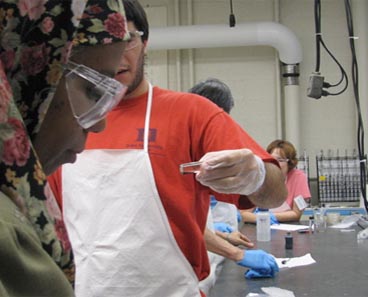Nano-technology comes to Philadelphia’s public schools
April 8, 2009 - “After a week of researching and investigating a problem and finding a solution using nanotechnology, I found myself very attracted to the subject,” Sarita Saju recalls. Her interest in the subject was sparked at a summer session of ITEST-Nano, a collaboration of Penn GSE, Penn’s Nano/Bio Interface Center, and the School District of Philadelphia.
 Funded by the National Science Foundation, the project is directed by GSE Assistant Professor Susan Yoon and Engineering and Applied Science Associate Professor Jorge Santiago and works to bring cutting-edge technology, curriculum, and instruction to Philadelphia ninth- and tenth-grade students.
Funded by the National Science Foundation, the project is directed by GSE Assistant Professor Susan Yoon and Engineering and Applied Science Associate Professor Jorge Santiago and works to bring cutting-edge technology, curriculum, and instruction to Philadelphia ninth- and tenth-grade students.
More formally known as Nanotechnology and Bioengineering in Philadelphia Public Schools, ITEST-Nano boosts students’ research skills while also teaching them about nanotechnology and bioengineering. At a time when interest in science is on the decline among American youth, the project also aims to encourage participating students to pursue science, engineering, and IT careers.
“Science and engineering research and applications have expanded exponentially,” explains Yoon, “and our schools and curricula need to keep pace with what is happening in the real world.”
Saju, a junior at Philadelphia’s George Washington High School, began working in Santiago’s lab in 2008. During the school year, she worked with Penn post-doctoral fellow Mariem Rosario-Canales to design a hybrid super-capacitor. “This type of capacitor is of substantial technical importance,” Santiago explains, “particularly as new electrical energy generation schemes are being implemented.” His assessment has ample third-party confirmation: Saju’s project, “Polymer-Wrapped Carbon Nanotubes as Electrode Materials for Supercapacitors,” has won local and national awards.
Saju’s experience is exactly what Yoon and Santiago had in mind when they launched the project. “We know that science is dynamic and innovative,” says Yoon, “but how can we show our students? ITEST-Nano is proving to be a very effective approach.”
The program, which launched in 2008, begins with a summer institute that introduces teachers to the field. During the three-week workshop, they design problem-based curriculum units and field-test them with Philadelphia students.
Then during the school year, teachers implement what they have learned over the summer, introducing their students to the basics of nanotechnology and bioengineering. In the project’s first year, ITEST researchers were thrilled to discover that many teachers in the first cohort had even broadened their approach, creating Google groups, for example for all of their classes, not just in the classes where the ITEST-Nano curriculum was used.
“Seeing this spread of new ideas and practices in the classrooms,” says Yoon, “showed us that this could be truly transformational practice.”
As the project continues, researchers and teachers will be working with school district principals and administrators to improve the alignment of the ITEST units with the standard curriculum adopted throughout the District.
“We are hoping,” Yoon continues, “to foster and establish this new and effective approach to teaching and learning science as canonical practice – something that teachers and students will continue to use, and refine, long after the project is over.”
As for Saju, she’s considering a career in science. “I never worked in a lab until my first internship,” she says, “and I realize I like working in a lab environment. I can never thank the teachers and professors from ITEST-Nano enough for giving me a wonderful, amazing experience."
For more information about this project, click here.
